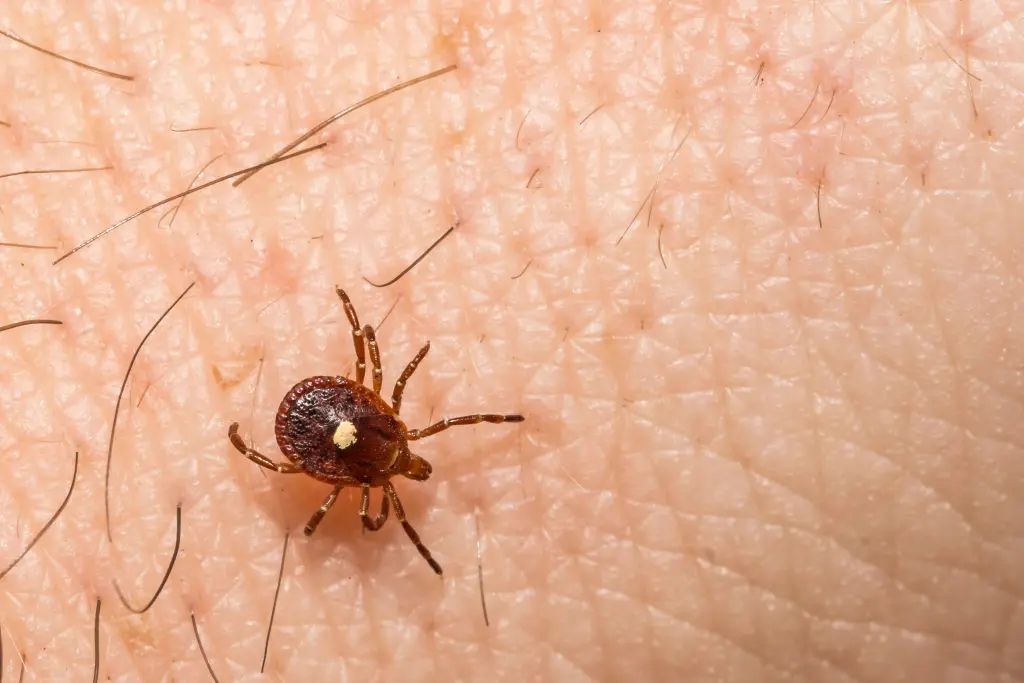Tragedy in New Jersey: 47-Year-Old Airline Pilot Becomes the World’s First Confirmed Fatality from Alpha-Gal Syndrome — a Meat Allergy Triggered by a Tick Bite
It began as an ordinary summer day — sunshine, laughter, and a backyard barbecue shared among family and friends. By nightfall, it had turned into a tragedy no one could have imagined. A 47-year-old airline pilot from New Jersey collapsed and died just hours after eating a hamburger, marking what experts are now calling the first documented fatality from a tick-borne meat allergy known as Alpha-gal Syndrome.

According to a case report published by researchers from the University of Virginia School of Medicine, the pilot had unknowingly developed the condition after being bitten by a Lone Star tick — an aggressive species native to the southeastern United States that has now spread as far north as New Jersey and New York. The bite set off a chain reaction that changed his immune system, turning red meat into a deadly allergen.
For years, Alpha-gal Syndrome was regarded as a medical curiosity — a bizarre allergy that caused delayed reactions to beef, pork, and lamb several hours after consumption. But this case has changed everything. “This is the first known fatality we’ve seen from Alpha-gal Syndrome,” the researchers wrote. “It’s a reminder that even conditions thought to be rare or mild can become life-threatening.”
The unnamed victim, described as an otherwise healthy and active man, had experienced a similar episode just two weeks before his death. During a family camping trip, he ate steak for dinner and woke up several hours later with severe stomach pain, vomiting, and diarrhea. The symptoms eventually subsided, and he brushed it off as food poisoning or a bad case of indigestion.
Two weeks later, on the evening of the fatal event, the pilot attended a backyard barbecue where he ate a hamburger — unaware that his body’s immune system had been irreversibly altered. Around four hours later, he began to feel the same crushing abdominal pain as before. This time, he never recovered. His son found him collapsed on the bathroom floor, unresponsive. Paramedics rushed to the home, but despite all efforts, he was pronounced dead at the scene.

It wasn’t until weeks later, after the family consulted medical experts, that the connection was made. Tissue samples sent to the University of Virginia’s lab tested positive for high levels of alpha-gal–specific IgE antibodies, confirming that he had Alpha-gal Syndrome — and that the allergic reaction to red meat had triggered fatal anaphylaxis.
Alpha-gal Syndrome, first identified in the early 2000s, is triggered when a Lone Star tick injects a sugar molecule called galactose-alpha-1,3-galactose (alpha-gal) into a person’s bloodstream. The body’s immune system misidentifies the molecule as a foreign invader and produces antibodies against it. Because red meat contains the same molecule, the next time a person consumes it, their immune system launches a full-scale allergic response — often hours after eating.
What makes this allergy especially dangerous is its delayed onset. Unlike peanut or shellfish allergies, where symptoms occur immediately, Alpha-gal reactions can take up to six hours to appear. That delay often leads victims to underestimate the cause or fail to connect the dots between what they ate and how they feel later.
In this case, the delayed timing proved fatal. The pilot went to bed thinking the discomfort would pass — and never woke up again. His death, now confirmed as the first of its kind, has sparked renewed concern among doctors and public health officials who warn that Alpha-gal Syndrome is far more common than previously believed.
The Centers for Disease Control and Prevention (CDC) estimates that more than 100,000 Americans may have developed some form of Alpha-gal sensitivity, though many remain undiagnosed. Cases have been reported in nearly every state, with clusters emerging in New Jersey, Virginia, North Carolina, and parts of the Midwest.
“The Lone Star tick used to be a Southern issue,” said Dr. Scott Commins, one of the leading researchers on the condition. “But climate change and animal migration have pushed its habitat northward. We’re seeing cases in areas that never had them before.”
The New Jersey pilot’s story illustrates the insidious nature of tick-borne allergies. He was a fit, non-smoking, middle-aged man with no history of severe allergic reactions. He had received regular physicals for his job and was cleared for flight duty just months before his death. The idea that a simple tick bite — invisible, nearly forgotten — could later make a hamburger deadly was unimaginable to his family.
His wife, speaking to local reporters, said the family had no idea such a condition even existed. “He was healthy, happy, and strong. He just ate dinner and went about his evening. None of us could have known that something like this could happen.”
The autopsy revealed no external signs of trauma. Internal findings showed swelling in the airways consistent with an allergic reaction. Blood tests confirmed elevated histamine levels, and specialized allergy panels revealed antibodies specific to alpha-gal — the final, heartbreaking confirmation of what killed him.
Alpha-gal Syndrome has baffled doctors for over a decade, in part because its symptoms vary widely. Some people experience mild hives or gastrointestinal distress, while others face severe allergic shock. In rare cases, as shown here, the reaction can become fatal. The unpredictability makes it difficult to diagnose and even harder to prevent.
Researchers warn that alcohol, exercise, and certain medications can worsen or accelerate reactions. In the pilot’s case, investigators suspect that moderate alcohol consumption at the barbecue may have contributed to the severity of the attack by speeding the absorption of the allergens into his bloodstream.
The study also highlights how unrecognized the condition remains. Even with thousands of suspected cases, many doctors are unaware of it, and testing for alpha-gal antibodies isn’t yet part of standard allergy panels. “Awareness is the key,” said Dr. Commins. “The symptoms can look like anything — stomach upset, rash, fainting — and because of the delay, patients often end up in the ER without realizing it’s connected to what they ate.”
The Lone Star tick, identified by the distinctive white dot on its back, is notorious for spreading Alpha-gal Syndrome. Unlike deer ticks, which transmit Lyme disease, Lone Star ticks primarily cause allergic sensitization rather than bacterial infection. The bites often go unnoticed, especially in summer when people wear shorts or go hiking. Experts recommend using insect repellents containing DEET, wearing long sleeves and pants in wooded areas, and checking skin carefully after outdoor activities.
The New Jersey man’s death is now prompting calls for increased education among healthcare providers and the public. Public health officials say more outreach is needed in regions seeing growing tick populations. Awareness campaigns about Lyme disease are common, but few mention Alpha-gal. “We’ve spent years warning about Lyme,” said one allergist. “Now we have to add a new line: Don’t just watch for rashes. Watch for what you eat afterward.”
For the pilot’s family, the tragedy is both personal and preventable. His wife has since started sharing his story to raise awareness of Alpha-gal Syndrome and tick prevention. “If we had known, we could have helped him,” she said. “He might have stopped eating meat. He might still be here.”
As heartbreaking as it is, experts believe his case will save lives. Doctors are now advising that anyone who experiences unexplained allergic reactions after eating red meat — especially in tick-heavy areas — should request testing for alpha-gal antibodies. Those diagnosed with the condition can live safely by avoiding mammalian products and carrying an epinephrine injector for emergencies.
The pilot’s death has transformed an obscure allergy into a public health wake-up call. It serves as a stark reminder that even the smallest creatures — in this case, a tick barely the size of a sesame seed — can have life-altering consequences. In the words of one researcher, “Ticks have always been dangerous. But now we know they can change what you eat, how you live, and — tragically — whether you live at all.”



